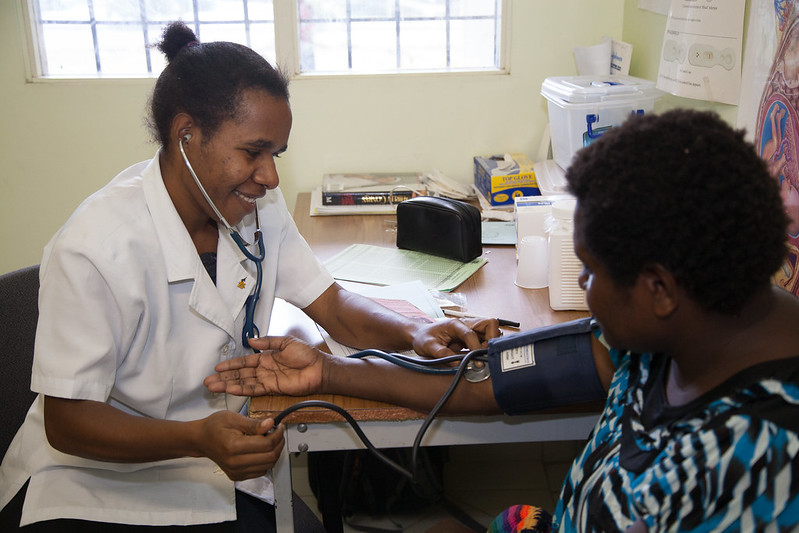
Papua New Guineans have a right to basic services such as health care
Politics, business and the state in Papua New Guinea: part two
By Rabbie Namaliu
1 May 2023
This is part two of an edited extract from a speech by former Papua New Guinean Prime Minister Sir Rabbie Namaliu delivered at a 1995 conference in Australia, and published in the Pacific Economic Bulletin in the same year. Sir Rabbie died on 31 March 2023: read his eulogy.
I do not want to go over all our problems.
I merely will mention one or two which must be addressed without delay.
The first, the most urgent, and the most tragic, is the failure of successive governments – including my own – to really deliver basic services, services our people have a right to.
Recently, the founder of our nation, Sir Michael Somare, commented that many of our people are worse off in terms of basic services and facilities than they were at independence. The rundown in basic services, such as health care and rural roads, is not only a tragedy, it is totally inexcusable.
The second great problem we face is an alarming decline in respect for authority, as evidenced by a breakdown in law and order in both urban and rural communities alike. While there is a relationship between poor services and a decline in law and order, there need not be. Restoring law and order is as much about restoring respect for authority as it is about police efficiency, tougher penalties and ending the ‘revolving door’ practice which seems to be universal in our prisons. Respect for authority – at all levels – is at an all time low, and that is largely due to perceptions, accurate or otherwise, about the performance and standing of leaders, especially political leaders.
I want to deal in more detail with the service delivery area, because I see it as being absolutely critical to our future harmony, unity and progress.
The first requirement of government in Papua New Guinea today, and for as far as I can see into the future, must be improved service delivery for all people, coupled with a major upgrading and restoration of public infrastructure, particularly our roads, government services and facilities.
Some of our social indicators are quite disturbing – such as high infant mortality, stagnating literacy levels and an escalation in crime rates.
Money alone will not solve these problems. With a comparatively high level of public expenditure as a percentage of GDP – almost double that of Indonesia and Colombia – we lag behind both these countries in terms of primary school enrolment, literacy and real GDP growth.
The vital question is how we spend, not what we spend. We are spending too much on our bureaucracy and on other recurrent expenditure areas, and nowhere near enough to service delivery and on basic infrastructure.
I believe we have to admit that government alone cannot meet the service delivery needs of our people.
If we accept that government alone cannot provide basic services adequately, what is the alternative?
Papua New Guinea is a Christian country. The mainstream churches played vital roles in our early development, and they continue to serve our people well. I believe the government needs to draw on the resources, the energy and dedication of our churches to assist in the delivery of health care, education, welfare, training and rural extension, and that the churches should be fully subsidised for doing so.
Just as we need to involve churches and community groups in service delivery, we must involve our women more actively in politics and leadership. We can have no pride in the fact that we have not had a woman in our national parliament since 1987, and that only three women have served in parliament in the 20 years since independence.
While our women have made progress, achieved success, in the diplomatic service, and areas of the public service, progress and involvement at the national political level has been quite inadequate, and rather unfortunate. I hope all our main parties will endorse, and support, women candidates in winnable seats in the 1997 national elections.
There is a trend towards getting government out of business, and that is something I welcome. Government must concentrate on core service areas, and on overall economic management, and not on business enterprises.
Money alone is not the answer. It lies more in strong, firm leadership and good government.
Despite the extent of our problems – and the deep-seated, historic nature of some of them – we have cause for optimism about the future. But that optimism is not going to become a reality by good luck – there is no substitute for good government, and strong, honest leadership. Finally, we must never be afraid to seek the advice of our friends, and those who have enduring goodwill for us.
Government, and leadership in government, is not easy. Plenty of political leaders will attest to that. In a young, developing country such as Papua New Guinea, it is as tough as it gets.
While I remain basically optimistic about our future, I am concerned that we have little time to get it right. Time is just not on our side.
The four million people of Papua New Guinea deserve good government and the opportunity to share in the benefits of sound growth. All our leaders have a solemn duty to provide it.
This is the second blog in a two-part series. Read the original article in the Pacific Economic Bulletin.
About the author/s
Rabbie Namaliu
Sir Rabbie Namaliu was the fourth prime minister of Papua New Guinea.
